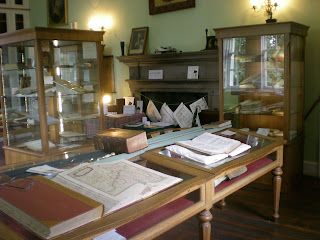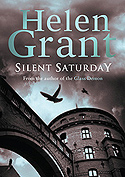As anyone who reads this blog regularly will know, I have been spending quite a lot of time recently at Innerpeffray Library, the oldest lending library in Scotland, where I have been transcribing excerpts (especially the bits about lechery and bawdiness) from various arcane antiquarian books for the edification of my readers.
I am sorry to say that 31st October, Hallowe'en, is also the last day before Innerpeffray Library closes for the winter (sob!). I have a busy schedule today because as well as working on The Demons of Ghent, the second book in my upcoming trilogy, I am also visiting Strathallan School this afternoon to tell them some seasonal spooky stories! All the same I couldn't bear to let pass this last opportunity to nip over to Innerpeffray before the books go into hibernation until March, and copy out a few more gems for the delectation of those who, like me, love anything old, sinister and frankly bizarre.
So, especially for Hallowe'en, here are some sections from my great favourite, the Treatise of Specters, and from that other rollicking tome, The Discovery of Witchcraft.
Let us start with the Treatise, which offers us some delightful tales of leprosy inflicted by witchcraft.
These two passages are from the part entitled An History of Strange Apparitions, and cunning delusions of Devils.
The first one brings whole new meaning to that thing my mother used to say to me when I was a child, about not making a nasty face in case the wind changed and it stuck that way. Here, a sudden wind brings disfiguring disease:
NB Brisacum is probably the French town of Neuf-Brisach, close to the German border. The other name was not clearly legible but is evidently another town close by.
The second story, below, mentions the "black wood", presumably the Black Forest on the other side of the border. Here, a witch engages in the traditional occupation of cursing her tormenter:
So, especially for Hallowe'en, here are some sections from my great favourite, the Treatise of Specters, and from that other rollicking tome, The Discovery of Witchcraft.
Let us start with the Treatise, which offers us some delightful tales of leprosy inflicted by witchcraft.
These two passages are from the part entitled An History of Strange Apparitions, and cunning delusions of Devils.
324. In the Constantiensian
Diocess, betwixt the Towns of Brisacum
and Fitourgum (Ertourgum?), a leprous woman told to many
auditors, that she falling out with another woman, and many railing words
passing betwixt them; as soon as she came home, a sudden wind blowed upon her
which came from the house wherein the woman dwelled (opposite to her) with whom
she had contention, with which she conceived she was so struck, that she was
thereby infected with a Leprosie, whereof she could never be cured.
325. In the same Diocess and Territories of the black wood,
a hang-man lifting up a Witch from the ground by a pole of wood, she turning
her self toward him, saith, I will give thee thy wages; and together with these
words blowing on the face of the hangman, she infected it with an ugly
Leprosie, whereof he dyed within a few dayes after.
And to conclude, here is a piece from the Discovery of Witchcraft, without which no Hallowe'en blog post would be complete. This is from Book IV (the one with all the lechery etc.). In this chapter we hear about the activities of Incubus, an evil spirit that comes to women in the night, and not just to read them a bed-time story.
CHAP. V.
Of Bishop Sylvanus his
Lechery opened and covered again. How Maids having yellow hair are most
combered with Incubus. How marryed
men are bewitched to use other mens wives, and to refuse their own.
[1]You shall read in the Legend, how in the night-time Incubus
came to a Ladies bed-side, and made hot love unto her: whereat she being
offended, cryed out so loud, that company came and found him under her bed in
the likeness of the holy Bishop Sylvanus,
which holy man was much defamed thereby, until at the length this infamy was
purged by the confession of a Devil made at S. Jeroms tombe. [2]O
excellent piece of Witchcraft wrought by Sylvanus!
Item, S. Christine would needs take unto her another maids Incubus, and lie in her room: and the
story saith, that she was shrewdly accloyed. But she was a shrew indeed, that
would need change beds with her fellow, that was troubled every night with Incubus, and deal with him her self. But
here the Inquisitors note may not be forgotten, to wit, that Maids having
yellow hair[3],
are most molested with this Spirit. Also, it is written in the Legend, of S. Bernard, that a pretty Wench that had had the use of Incubus his body by the space of six or
seven years in Aquitania (being
belike weary of him, for that he waxed old) would needs go to S. Bernard another while: but Incubus told her, that if she would so
forsake him, being so long her true lover, he would be revenged upon her, &
c. But, befal what would, she went to S. Bernard,
who took her his staffe, and bad her lay it in the bed beside her. And indeed
the Devil fearing the bed-staffe, or that S. Bernard lay there himself, durst not approach into her chamber that
night: what he did afterwards, I am uncertain. Marry you may find other
circumstances hereof, and many other like bawdy lies in the golden Legend. But here again, we may
not forget the Inquisitors note, to wit; that many are so Bewitched, that they
cannot use their own wives, but any other bodies they may well enough away withal.
Which Witchcraft is practised among many bad husbands, for whom it were a good
excuse to say they were Bewitched.
[1] In via Hieronym.
[2] Saints as
holy and chast as horses and mares.
[3] Maids having
yellow hair. Mal.malef.par.2.qu.2.cap.2
This is rather a muddled chapter, mixing up various different tales, but it amused me all the same, especially with its claim that the libidinous Incubus prefers "maids having yellow hair"! The Golden Legend referred to as a source work for this chapter was a popular mediaeval work collecting stories about saints including supernatural ones. I also like the tale of the pretty girl who tired of her demon lover because he was getting too old!
When Innerpeffray Library opens again in March I shall post some more excerpts. In the meantime I hope those who have read the ones I have already posted have enjoyed them, and I wish everyone a Happy Hallowe'en!
Above: a demon, from Fairford church (photo by William Bond). I don't think this
one is an incubus though!
When Innerpeffray Library opens again in March I shall post some more excerpts. In the meantime I hope those who have read the ones I have already posted have enjoyed them, and I wish everyone a Happy Hallowe'en!

























